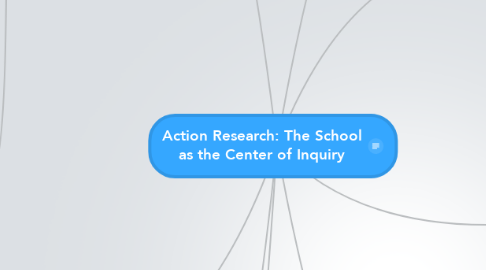
1. What?
1.1. Definition: "Action research in education is study conducted by colleagues in a school setting of the results of their activities to improve instruction."
1.2. cooperative, rather than individual
2. How?
2.1. Traditional Research
2.1.1. led by - outside experts
2.1.2. purpose - developing new knowledge
2.1.3. data types - quantitative or qualitative
2.1.4. purpose of data - understand phenomenon or test hypothesis
2.1.5. quality - peer reviews
2.1.6. audience - other researchers, profession, government or private agencies
2.2. Steps
2.2.1. 1) select an area of focus
2.2.2. 2) conduct a needs assessment
2.2.2.1. eyes and ears
2.2.2.2. systematic classroom and school observations
2.2.2.3. official records
2.2.2.4. review of teacher and student work
2.2.2.5. open-ended surveys
2.2.2.6. charts, groups or lists
2.2.2.7. Delphi method
2.2.3. 3) create an action plan
2.2.3.1. diagrams, charts, cycles, analysis, strategic planning, etc.
2.2.4. 4) implementation
2.2.4.1. ways to observe: frequency, performance indicators, verbatim, open-ended narrative, observations, questionnaires, etc.
2.2.5. 5) evaluation
2.2.5.1. revision if necessary
2.2.5.2. questions for consideration
2.2.5.2.1. purpose of evaluation
2.2.5.2.2. who will evaluate
2.2.5.2.3. what questions must be answered
2.2.5.2.4. how to gather data
2.2.5.2.5. data analysis
2.2.5.2.6. how to report findings
2.3. Action Research
2.3.1. led by - practitioners
2.3.2. purpose - solve problems or improve practice
2.3.3. data types - quantitative or qualitative
2.3.4. purpose of data - explore problems, guide action planning, evaluate results
2.3.5. quality - results in desired change
2.3.6. audience - school community
2.4. Supervision
2.4.1. teachers at VERY low levels of development
2.4.1.1. NOT ready for action research
2.4.1.2. intensive direct assistance and staff development
2.4.1.2.1. read articles about action research
2.4.1.2.2. shadow teachers involved in action research
2.4.1.2.3. attend workshops
2.4.2. teachers at FAIRLY low levels of development
2.4.2.1. directive informal supervision
2.4.2.2. supervisor to make suggestions on goals, data collection, analysis, action plans (teacher has a choice of those recommended)
2.4.3. teachers at a higher level of development
2.4.3.1. joint decision-making between administration and teachers
2.4.4. Supervisor Tasks for EVERYONE
2.4.4.1. direct-assistance activities
2.4.4.2. professional development activities
2.4.4.3. group-development activities
2.4.4.4. curriculum-development activities
3. Rules
3.1. 1) Everyone in the school CAN be involved in decision-making
3.2. 2) Anyone who does NOT want to be involved does not have to be
3.3. 3) When a decision is made, EVERYONE in the school MUST implement it
3.4. 4) One person, one vote (everyone as equals)
3.5. 5) Decisions limited to those that are the responsibility of the school (EX - not school board issues, contracts, other schools, personnel, etc.
3.6. 5) Use of small groups (large groups together will not get much accomplished - the loudest person always talks)
4. Suggestions
4.1. Executive Council
4.1.1. made up of members of the school and administrators, possibly parents and community members
4.1.2. purpose is to "okay" ideas for action research, not suggest them
4.1.3. executive council assigns task forces to help with implementation
4.2. teacher preparation
4.2.1. basic knowledge of gathering and analyzing data
4.2.2. basic knowledge of reviewing and summarizing data and drawing conclusions
4.3. risk
4.3.1. no teacher or student at risk
4.3.2. complete a list of ethical guidelines
4.3.3. process of reviewing to make sure everything complies with those guidelines
4.4. resources
4.4.1. resources, such as time to implement and gather data, have to be provided
4.4.2. time to share findings with the school
5. Who?
5.1. teachers
5.2. teacher leaders
5.3. administrators
5.4. NOT formal researchers
6. History
6.1. Kurt Lewin
6.1.1. studied democracy and relationships within groups
6.1.2. came up with the first idea of action research (social research)
6.1.3. social research - based on the actions groups take to improve their current conditions, not on controlled experiments (real conditions and real learning), further planning based on results
6.2. Stephen Corey
6.2.1. applied social research (Lewin's idea) to education
6.2.2. argument - traditional research is done by researchers, not educators, who are outside the public school and cannot influence (or change) school practice with the findings
6.2.3. research done personally will be more internal and most likely result in improving a situation
7. Alternatives
7.1. Interpretive
7.1.1. study of phenomenon that occur and what meaning the participants (teachers, students, etc.) make from those phenomenon
7.1.2. EX - school culture, classroom implementation of curriculum, student/teacher interaction
7.2. Critical
7.2.1. examines and challenges practices that maintain inequalities
7.2.2. Ex - high school tracking system?
